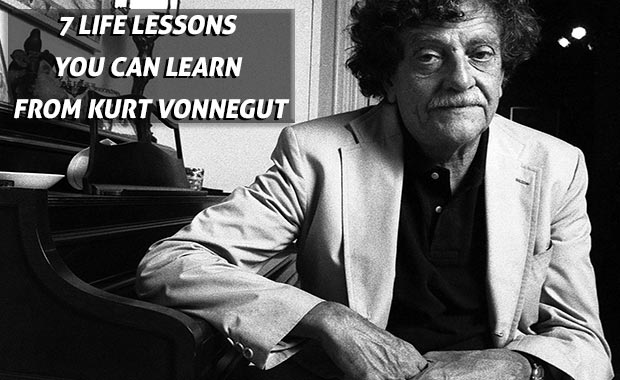Life
7 Life Lessons You Can Learn From Kurt Vonnegut

Writer Kurt Vonnegut was an American literary icon who was beloved as much for his attitudes about life as for his unique style of writing.
Born in 1922, he was marked in his early life by his experiences in WWII and dedicated much of his career to exposing the tragedies of war, particularly in works like his masterpiece Slaughterhouse Five and his last book A Man Without a Country. Vonnegut’s words and life serve as models for kindness, creativity and humor.
Here are 7 life lessons you can learn from him:
1. Don’t be lazy
In the beginning of his writing career, Vonnegut took in 3 of his sister’s children after both she and her husband died. He now had six children to care for. While working full-time as an advertising executive, Vonnegut also managed to write and publish five novels over the following decade. Though overburdened and overworked, he still managed to dedicate himself to his life’s passion: writing.
Always carve out time for the things that are important to you. Whether it’s waking up at 4am to write every morning before going to work or taking time during lunch breaks to work on a personal project, find the time in the corners of your life for the things you feel passionate about. That’s the only way they’ll find their way to center stage someday.
2. Be kind
Vonnegut’s experiences as a soldier in WWII left a deep impression on him. In order to make sense of such tragedy, Vonnegut concluded that kindness is the only thing that can redeem humanity. In his novel God Bless You, Mr. Rosewater, he wrote, “There’s only one rule that I know of, babies – God damn it, you’ve got to be kind.”
Fire can’t put out fire and hatred can’t dispel hatred. The only way to win a battle against injustice and hatred is love and kindness.
When you’re faced with a situation that invites you to respond with anger, remember that this will only perpetuate the problem. Compassion and love are gifts you can offer not only to the other person, but to yourself in those moments.
3. Don’t forget to laugh
Vonnegut was a champion of humor and not taking life too seriously. Taking life too seriously never got anyone anywhere. But laughing and sharing laughter can give you exactly the right distance you need from your troubles.
The next time you find yourself feeling overburdened, make a conscious effort to lighten up. Watch a comedy, call a friend who makes you laugh, play with your children or your pet, or just go out for a night of dancing. Whatever makes you smile.
“Laughter and tears are both responses to frustration and exhaustion. I myself prefer to laugh, since there’s less cleaning up to do afterward.” – Kurt Vonnegut
4. Don’t be afraid to be different
One of the things that made his writing outstanding was the non-traditional way he wrote. Long sentences, exuberant use of exclamation points and italics, the mixing of genres made his books extraordinary and a style all his own. He wouldn’t have become the icon he became if he’d done what everyone else did.
Maybe you’re afraid what people will think if you dress a certain way, play a certain kind of music or express an unpopular political opinion. Have the courage to say, wear, think and be who you are. Many of the most celebrated writers, painters, scientists and thinkers were those who ran against popular opinion. Don’t let fear squelch your brilliance – let it shine.

5. Take care of the environment
Vonnegut was also a champion of environmental causes: “I really wonder what gives us the right to wreck this poor planet of ours.” The planet has its limits, so getting behind those who are trying to live in harmony with those limits is a worthwhile cause.
Seek out information either from local environmental enthusiasts or the Web. Look at your lifestyle and see how you can contribute to making sure your passage through this planet is less harmful. These changes don’t have to be huge. There are a myriad of small things you can do to minimize your impact. By becoming conscious you also help spread consciousness to others.
6. Don’t get caught up in dogma
Vonnegut was a critic of organized religion. To him, the purpose of human life was a continuous mystery and not necessarily one that should or could be solved.
Whether you follow a religion or not, it’s important to keep an open mind about the possibilities of our existence. This allows for acceptance of others, and fosters healthy curiosity and peaceful coexistence.
Instead of preaching to others about your religion, try something different. Try to find out more about other people’s faith. The more knowledge and information you have about other types of religions, the more tolerant you will be. If more people practiced this, there might be less conflict in the world.
“She was a fool, and so am I, and so is anyone who thinks he sees what God is doing” – Kurt Vonnegut
7. Express yourself
In his last novel A Man Without a Country, he urged people to find a means of creative expression: “…go into the arts…They are a very human way of making life more bearable. Practicing an art, no matter how well or badly, is a way to make your soul grow, for heaven’s sake. Sing in the shower. Dance to the radio. Tell stories. Write a poem to a friend, even a lousy poem. Do it as well as you possible can. You will get an enormous reward. You will have created something.”
Creative expression is a gift and one that’s uniquely human. The arts are a means of self-understanding.
Find a way to express yourself. Everyone has something inside of them to share. Try out different ways of expression until you find yours. You won’t regret it.
Enjoy these life lessons from a great writer and humanitarian!
Life
Imposter Syndrome Is Rooted in Your Past But Here’s How You Can Rewire It
Imposter syndrome is most prevalent in highly successful women

Imposter syndrome is “the persistent inability to believe that one’s success is deserved or has been legitimately achieved as a result of one’s own efforts or skills.” (more…)
Life
The Surprising Mental Health Tool You Probably Haven’t Tried
Through journaling, I arrived at a more balanced perspective, it reinstated my sense of gratitude and led me to accept my disability

In two particularly difficult times in my adult life, my journaling practice is helping me heal emotionally. It has been a vital tool for helping me see the bigger picture and land in a place of gratitude. (more…)
Life
How to Stop Comparing Yourself to Others and Find True Happiness
Comparison is the thief of joy; it robs us of our happiness, self-esteem, and peace of mind

In today’s hyperconnected world, it’s easier than ever to fall into the trap of comparing ourselves to others. Social media platforms like Instagram, Facebook, and LinkedIn constantly bombard us with curated highlights of other people’s lives, making it seem like everyone else is happier, more successful, and more fulfilled than we are. (more…)
Life
Harness the ‘Battery Effect’ to Transform Life’s Tensions into Your Greatest Strength
Recharge your life batteries by shifting your mindset today

I believe our life capacity is determined by the skillsets we develop on this spinning rock we call Earth. By “life capacity,” I mean our ability to embrace and sustain joy. (more…)
-

 Did You Know4 weeks ago
Did You Know4 weeks ago7 Surprising Life Lessons Video Games Taught Me That School Never Did
-

 Success Advice4 weeks ago
Success Advice4 weeks agoHow Playing by the Rules Became the Smartest Business Strategy
-

 Success Advice4 weeks ago
Success Advice4 weeks agoHow to Build Trust, Kill Micromanagement, and Lead a Team That Thrives
-

 Success Advice3 weeks ago
Success Advice3 weeks agoSuccess Isn’t Sexy: 5 Daily Habits That Actually Work
-

 Scale Your Business3 weeks ago
Scale Your Business3 weeks agoHow to Build a Workplace People Actually Want to Show Up To
-

 Scale Your Business3 weeks ago
Scale Your Business3 weeks agoHow Smart Entrepreneurs Cut Financial Chaos in Half with One Simple Switch
-

 Success Advice3 weeks ago
Success Advice3 weeks agoBreaking the Bias: How Females Can Thrive In The Workplace in 2025
-

 Scale Your Business3 weeks ago
Scale Your Business3 weeks agoThis Is How Successful Entrepreneurs Manage Their Time Differently






























4 Comments